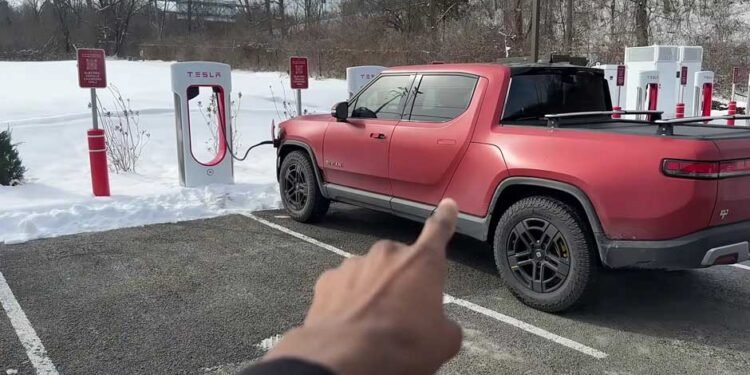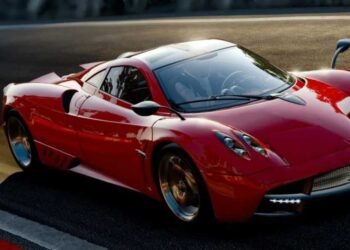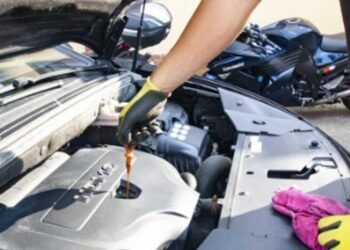Rivian has become a leading electric vehicle (EV) manufacturer, offering rugged, adventure-ready trucks and SUVs. As EV adoption increases, buyers are increasingly emphasizing access to reliable charging infrastructure.
Tesla’s Supercharger network is one of the most widespread and efficient charging systems in the country, making it an attractive option for EV owners. However, compatibility between different brands isn’t always guaranteed.
For those considering a used Rivian truck, understanding whether Rivian vehicles can utilize Tesla chargers is essential. This article will examine Tesla’s charging technology, Rivian’s built-in capabilities, and recent industry developments to paint a clear picture of your charging options.
What Is the Tesla Charging Network?
Tesla’s charging infrastructure is divided into two primary categories: Superchargers and Destination Chargers. Superchargers provide high-speed DC fast charging, allowing Tesla vehicles to recharge quickly on long trips. Destination Chargers, on the other hand, are Level Two chargers typically installed at hotels, restaurants, and shopping centers for slower, overnight charging.
One major distinction of Tesla’s network is its proprietary connector, which differs from the Combined Charging System (CCS) standard used by most other EV manufacturers, including Rivian. This difference in charging ports initially made Tesla chargers inaccessible to non-Tesla vehicles.
However, Tesla has recently begun opening select Superchargers to non-Tesla EVs using the Magic Dock, a built-in adapter that allows CCS-equipped vehicles to charge. While this expansion increases charging options for Rivian owners, not all Tesla chargers are currently accessible, and availability varies by location.
What Are Rivian’s Charging Capabilities?
Rivian vehicles are designed with versatile charging capabilities to accommodate different charging networks. Rivian trucks and SUVs use the CCS standard, which public charging stations across North America widely support. This allows Rivian owners to access high-speed DC fast chargers from networks like Electrify America, EVgo, and ChargePoint, as well as standard Level Two AC chargers.
To enhance charging convenience, Rivian is developing its own Adventure Network, which consists of fast chargers installed along popular outdoor destinations and highways. These chargers are designed specifically for Rivian cars and provide high-speed charging similar to Tesla’s Superchargers. Additionally, Rivian owners can install a Level Two charger at home for overnight charging.
Can Rivian Trucks Use Tesla Chargers?
Rivian vehicles cannot directly use Tesla Superchargers due to differences in charging connectors. Tesla’s network was initially built with a proprietary plug, making it incompatible with non-Tesla EVs.
However, Tesla has started to open select Supercharger locations to CCS-equipped vehicles, including Rivian, via the Magic Dock. This built-in adapter allows non-Tesla EVs to connect to select Superchargers without needing additional hardware.
While the Magic Dock expands your charging options, it’s not available at all Tesla Supercharger stations. Rivian owners must check Tesla’s updated Supercharger map to find stations that support CCS charging. Rivian vehicles can also use Tesla Destination Chargers, which are Level Two chargers, but only with the proper adapter.
The increasing availability of cross-compatible charging solutions marks a positive shift for EV owners. However, Rivian drivers should still rely on CCS-compatible stations as their primary charging option, using Tesla chargers as a secondary solution when available. As EV charging continues to evolve, further integration between different EV brands and charging networks is expected.
Are There Any Third-Party Adapter Solutions?
While Tesla’s Magic Dock provides limited Supercharger access for Rivian owners, third-party adapters may offer additional charging options. Some aftermarket companies have developed adapters that allow CCS-equipped vehicles, like Rivian, to connect to Tesla Destination Chargers and older Tesla wall connectors. However, these adapters don’t work with Tesla Superchargers due to differences in software and power delivery.
As charging standards change, manufacturers may introduce official adapters to bridge compatibility gaps. Until then, Rivian owners should verify adapter compatibility before purchasing and rely primarily on CCS chargers and Rivian’s Adventure Network for reliable and efficient charging solutions.
What Is the Future of Charging Compatibility?
The electric vehicle industry is moving toward greater charging interoperability, making it easier for drivers to access various charging networks.
For example, Tesla’s decision to open select Superchargers to non-Tesla vehicles using the Magic Dock is a step toward a more unified charging ecosystem. As more Supercharger stations adopt CCS compatibility, Rivian owners will have increased access to fast charging options beyond the Rivian Adventure Network and public CCS stations.
Additionally, automakers are working toward adopting a standardized charging infrastructure. Some manufacturers, including Ford and General Motors, have announced partnerships with Tesla to expand Supercharger access for their vehicles. If Rivian follows a similar path, direct Supercharger compatibility could become a reality.
The Bottom Line on Rivian Charging
As EV adoption grows, the push for universal charging solutions will likely continue, benefiting all EV owners. For now, Rivian drivers should stay informed about charging changes to maximize convenience and accessibility on the road.












